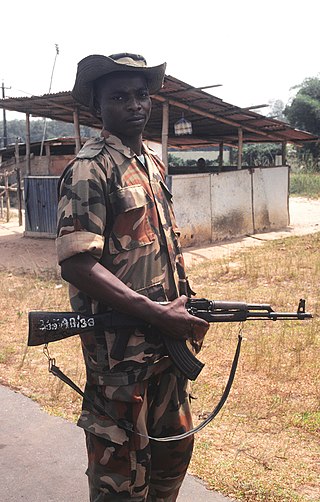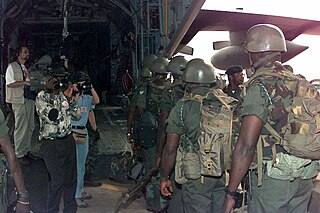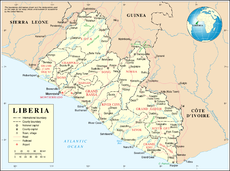
The United Nations Mission in Liberia (UNMIL) was a United Nations peacekeeping operation established in September 2003 to monitor a ceasefire agreement in Liberia following the resignation of President Charles Taylor and the conclusion of the Second Liberian Civil War (1999–2003). At its peak it consisted of up to 15,000 UN military personnel and 1,115 police officers, along with civilian political advisors and aid workers.

United Nations Security Council resolution 788, adopted unanimously on 19 November 1992, after determining that the deterioration of the situation in Liberia constituted a threat to international peace and security, the council imposed an arms embargo on the country for the purposes of establishing peace and stability.

United Nations Security Council Resolution 813, adopted unanimously on 26 March 1993, after reaffirming Resolution 788 (1992) and determining that the situation in Liberia constituted a threat to international peace and security, the Council condemned the failure of the parties in the country – the Armed Forces of Liberia, ULIMO, National Patriotic Front of Liberia and Independent National Patriotic Front of Liberia among others, to implement the Yamoussoukro IV Accord.

United Nations Security Council resolution 866, adopted unanimously on 22 September 1993, after reaffirming resolutions 813 (1993) and 856 (1993), the council noted that United Nations involvement would contribute significantly to the effective implementation of the peace agreement in Liberia and went on to establish the United Nations Observer Mission in Liberia (UNOMIL).

United Nations Security Council resolution 872, adopted unanimously on 5 October 1993, after reaffirming resolutions 812 (1993) and 846 (1993) on the situation in Rwanda and Resolution 868 (1993) on the security of United Nations operations, the council stressed the need for an international force in the country and therefore established the United Nations Assistance Mission for Rwanda (UNAMIR).

United Nations Security Council resolution 911, adopted unanimously on 21 April 1994, after reaffirming resolutions 813 (1993), 856 (1993) and 866 (1993), the Council welcomed progress made towards establishing the Liberian National Transitional Government but was concerned about subsequent delays in implementing the Cotonou Peace Agreement, and extended the mandate of the United Nations Observer Mission in Liberia (UNOMIL) until 22 October 1994.
United Nations Security Council resolution 950, adopted unanimously on 21 October 1994, after reaffirming resolutions 813 (1993), 856 (1993), 866 (1993) and 911 (1994), the Council noted the deteriorating situation in Liberia and extended the mandate of the United Nations Observer Mission in Liberia (UNOMIL) until 13 January 1995.

United Nations Security Council resolution 972, adopted unanimously on 13 January 1995, after reaffirming resolutions 813 (1993), 856 (1993), 866 (1993), 911 (1994) and 950 (1994), the council discussed the peace process in Liberia and extended the mandate of the United Nations Observer Mission in Liberia (UNOMIL) until 13 April 1995.

United Nations Security Council resolution 976, adopted unanimously on 8 February 1995, after reaffirming resolutions 696 (1991) and all subsequent resolutions on Angola, the Council authorised the establishment of a new peacekeeping mission in the country, the United Nations Angola Verification Mission III with an initial mandate ending on 8 August 1995.

United Nations Security Council resolution 985, adopted unanimously on 13 April 1995, after reaffirming resolutions 813 (1993), 856 (1993), 866 (1993), 911 (1994), 950 (1994) and 972 (1995), and 788 (1992) which imposed an arms embargo on Liberia, the council established a committee to monitor the implementation of the embargo and extended the mandate of the United Nations Observer Mission in Liberia (UNOMIL) until 30 June 1995.

United Nations Security Council resolution 1001, adopted unanimously on 30 June 1995, after reaffirming resolutions 813 (1993), 856 (1993), 866 (1993), 911 (1994), 950 (1994) and 972 (1995), and 985 (1995) on Liberia, the Council discussed the implementation of peace agreements in the country and extended the mandate of the United Nations Observer Mission in Liberia (UNOMIL) until 15 September 1995.

The United Nations Observer Mission in Liberia (UNOMIL) was a United Nations peacekeeping mission in Liberia. It was established in Resolution 866 (1993) and headquartered in the capital Monrovia.

United Nations Security Council resolution 1014, adopted unanimously on 15 September 1995, after recalling all resolutions on the situation in Liberia, particularly 1001 (1995), the council discussed various aspects of the civil war and extended the mandate of the United Nations Observer Mission in Liberia (UNOMIL) until 31 January 1996.

United Nations Security Council resolution 1020, adopted unanimously on 10 November 1995, after recalling all resolutions on the situation in Liberia, particularly 1001 (1995), the Council discussed the implementation of the peace process during the First Liberian Civil War and adjusted the mandate of the United Nations Observer Mission in Liberia (UNOMIL) to include other functions.

United Nations Security Council resolution 1041, adopted unanimously on 29 January 1996, after recalling all resolutions on the situation in Liberia, particularly 1020 (1995), the Council extended the mandate of the United Nations Observer Mission in Liberia (UNOMIL) until 31 May 1996 and discussed efforts to restore stability in the country.

United Nations Security Council resolution 1059, adopted unanimously on 31 May 1996, after recalling all resolutions on the situation in Liberia, particularly Resolution 1041 (1996), the Council extended the mandate of the United Nations Observer Mission in Liberia (UNOMIL) until 31 August 1996 and discussed the security situation in the country.

United Nations Security Council resolution 1071, adopted unanimously on 30 August 1996, after recalling all resolutions on the situation in Liberia, particularly Resolution 1059 (1996), the Council extended the mandate of the United Nations Observer Mission in Liberia (UNOMIL) until 30 November 1996 and discussed matters relating to UNOMIL.

United Nations Security Council resolution 1083, adopted unanimously on 27 November 1996, after recalling all resolutions on the situation in Liberia, particularly Resolution 1071 (1996), the Council extended the mandate of the United Nations Observer Mission in Liberia (UNOMIL) until 31 March 1997 and discussed matters relating to UNOMIL.

United Nations Security Council resolution 1100, adopted unanimously on 27 March 1997, after recalling all resolutions on the situation in Liberia, particularly Resolution 1083 (1996), the Council extended the mandate of the United Nations Observer Mission in Liberia (UNOMIL) until 30 June 1997.

The United Nations Observer Mission in Sierra Leone (UNOMSIL) was a United Nations peacekeeping operation in Sierra Leone from 1998 to 1999 that was established with the passage of United Nations Security Council Resolution 1181. Its mission was to monitor the military and security situation in Sierra Leone. The mission was terminated in October 1999, when the Security Council authorized deployment of a new, and significantly larger peacekeeping operation, the United Nations Mission in Sierra Leone (UNAMSIL).













